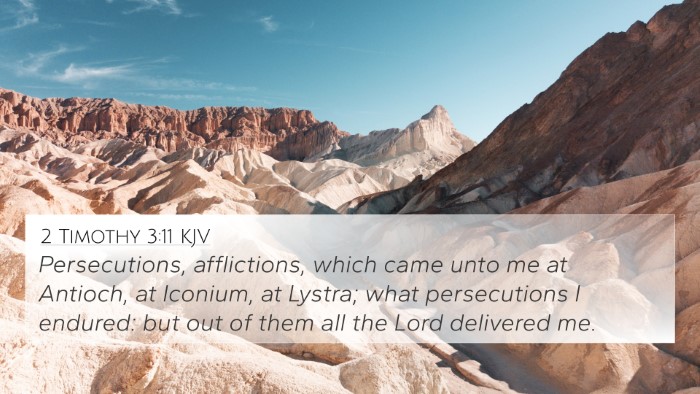Understanding Acts 13:51
Acts 13:51 states:
“But they shook off the dust of their feet against them, and came unto Iconium.”
This verse reflects a pivotal moment in the Apostle Paul's missionary journey, illustrating themes of rejection, judgment, and divine guidance. The act of shaking off the dust of their feet serves as a symbol of disassociation from those who reject the message of the Gospel. Below, we combine insights from various public domain commentaries to deepen the understanding of this verse.
Combined Commentary Insights
Matthew Henry's Commentary
Matthew Henry emphasizes the importance of the act of shaking off dust as a symbol of rejecting the unfaithful city. It signifies that the messengers of the gospel are not responsible for those who turn away from the truth. This act demonstrates obedience to Christ’s instructions and reflects the seriousness of the rejection faced by the apostles.
Albert Barnes' Notes on the Bible
Albert Barnes provides insight into the cultural significance of this action. In Jewish tradition, shaking the dust off one’s feet was a way to show disdain for a place that had rejected divine teaching. By doing this, Paul and Barnabas not only express their disapproval but also anticipate a broader mission in Iconium—a place that is more receptive.
Adam Clarke's Commentary
Adam Clarke notes that this gesture also serves a prophetic function, indicating that the judgment of God may follow those who reject His word. Clarke argues that the apostles literally perform their duty despite hostility, emphasizing their commitment to spreading the Gospel regardless of the opposition.
Thematic Exploration
This verse serves as a profound reminder of the apostles' experiences and the early Christian messaging context. Here are key themes that emerge:
- Rejection of the Gospel: The experience of Paul and Barnabas showcases the resistance the early church faced.
- Judgment and Accountability: Their physical act symbolizes the spiritual judgment pronounced on the rejectors of God's message.
- Perseverance in Mission: Despite rejection, the apostles continue their journey, indicative of their mission-driven dedication.
- Divine Guidance: This incident emphasizes the nudging of the Holy Spirit in guiding the apostles toward receptive audiences.
Cross-References for Acts 13:51
To better understand Acts 13:51, it is useful to identify other scripture passages that illuminate its themes:
- Matthew 10:14: “And whosoever shall not receive you, nor hear your words, when ye depart out of that house or city, shake off the dust of your feet.”
- Luke 9:5: “And whosoever will not receive you, when ye go out of that city, shake off the very dust from your feet for a testimony against them.”
- Acts 18:6: “And when they opposed themselves and blasphemed, he shook his raiment, and said unto them, Your blood be upon your own heads.”
- 1 Corinthians 15:58: “Therefore, my beloved brethren, be ye steadfast, unmovable, always abounding in the work of the Lord.”
- Acts 14:1: “And it came to pass in Iconium, that they went both together into the synagogue of the Jews, and so spake, that a great multitude both of the Jews and also of the Greeks believed.”
- Matthew 7:6: “Give not that which is holy unto the dogs, neither cast your pearls before swine.”
- Mark 6:11: “And whosoever shall not receive you, nor hear you, when ye depart thence, shake off the dust under your feet for a testimony against them.”
Conclusion
The act of shaking off the dust from their feet acted as a poignant symbol for Paul and Barnabas, marking the end of their ministry in one location and heralding the continuation of their mission in another. The interconnectedness of the verses on rejection and judgment throughout scripture encourages a broader understanding of the consequences of rejecting divine messages. As these interpretations highlight, the significance of Acts 13:51 can be understood not only through its immediate context but also in its connection to a broader biblical narrative.











